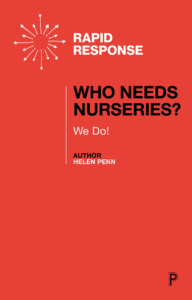Infants are born nearly helpless. Ideas and beliefs about how to care for them and educate them, about their nourishment and their learning, have shifted continually over time and place, and according to the wealth or poverty of the households into which they are born. The roles of mothers, fathers, families, relatives, friends, experts and hired help have been continually reimagined, reinterpreted and reinforced.
Feminists long ago argued the case for creating collective, public solutions as an antidote to isolated, nuclear families and women’s and children’s dependency within them. In the 1980s, community nurseries were one solution put forward: nurseries as a local service for local people, within pram-pushing distance, a community enterprise, or (as the vocabulary has shifted) a co-production, accountable to its users and workers, proud of what it offered and keen for everyone involved to scrutinise its actions and achievements. In the heady early days of nurseries, many local authorities – and even a Conservative government – was prepared to fund experiments with community nurseries along these lines. This view of a local, accountable public service also chimed with wider projects, in the EU and even the OECD.
Nurseries have flourished, but any utopian versions have succumbed, like so many other things, to the idea of market. Nurseries are now described in terms of the crudest of economic equations: simultaneously good for the economy because they enable mothers to work; good for the economy because companies can make money by selling childcare places; and finally, good for the economy – as illustrated in the theories of the Nobel prizewinning economist James Heckman – because they can correct those young children from poor households and teach them the skills their failing families lack, which benefits the economy in the long run. The turnaround in societal attitudes has been dramatic.
In the UK today, the dominant form of childcare provision is a private nursery. The core assumption of the Conservative government (and other governments before it) is that private-sector childcare is best placed to respond to the various needs of children, their mothers and their families. Childcare is an ‘industry’, a business dependent on profit making for its viability, and market criteria of growth and competition apply to childcare businesses. Government is committed to supporting the childcare industry, and acts as it would with other industries, in terms of subsidies, contracts and business development.
Assumptions about the robustness and appropriateness of private childcare have never been publicly discussed, dissected or voted upon. Like many policy assumptions in a marketised economy, it has crept into the lexicon largely unchallenged. More than 80 per cent of all nursery places are provided by private providers, who range along a continuum from dedicated small operators wanting to make positive changes in how young children are treated to big, unscrupulous market chains. These chains now control 7.5 per cent of all nursery places – that is around 81,500 places. This number of places is double what it was in 2018. The chains are continuing to expand, not by providing new places, but by gobbling up smaller nurseries or nursery groups through a process of acquisitions and mergers, financed by indebtedness to private equity firms and venture capitalism. 1,048 Ofsted registered nurseries are fully or partially controlled by investment companies. Nurseries, in other words, are becoming part of a speculative financial market, with risky financial operating models – models that have already led to high costs to consumers, profiteering, and the collapse of provision in health, adult care and children’s residential care.
Because of the insidious way in which the private market has developed, by default as much as by design, marketised childcare has largely been treated as a given. But it has shaped the quality, availability and cost of nursery places, and it has exacerbated inequality. A majority of mothers work – or want to – but are deterred by the huge costs of childcare – up to £14,000 a year in London. Childcare nurseries operate with a poorly qualified workforce, with many on minimum wage. There is a rapid turnover of staff and recruitment is near impossible. We not only need new money, but we also need new models of nursery provision. There are alternative options, and we need a government committed to exploring them.
Helen Penn is Professor Emerita at the University of East London, UK.
 Who Needs Nurseries? by Helen Penn, is available to order on the Policy Press for £7.99 here.
Who Needs Nurseries? by Helen Penn, is available to order on the Policy Press for £7.99 here.
Bristol University Press/Policy Press newsletter subscribers receive a 25% discount – sign up here.
Follow Transforming Society so we can let you know when new articles publish.
The views and opinions expressed on this blog site are solely those of the original blog post authors and other contributors. These views and opinions do not necessarily represent those of the Bristol University Press and/or any/all contributors to this site.
Image credit: BBC Creative on Unsplash


